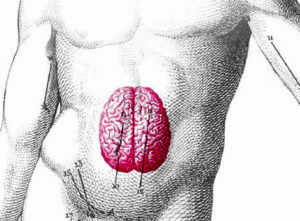Serotonin In Your Gut – Probiotics and Your Mood
Jessica Marshall, LDN CLT

70-80% of serotonin is located in your gut
A psychiatrist once coined the term “psychobiotics” after studying the terrible tragedy which hit Walkerton, Canada. Their water supply had been overrun by dangerous strains of bacteria after severe flooding. A handful of people died. After the illness had was over, scientists continued to find alarming rates of depression (Sanders, L. 2016). Did these strains of bacteria influence the GI tract enough to impact mood?
After conducting further research on probiotics and our gut (stomach), it’s been discovered 80-90% of serotonin is actually located in the gut. Serotonin is one of the brain chemicals that influences our mood. In fact, many drugs on the market for depression are based on the chemical reaction and mechanism by which we uptake serotonin in our brains. Because it appears the gut plays a role in our mood regulation, some refer to it as our “second brain”.
During an 8-week gut-mood study, 40 randomly selected depressed patients received one of 3 strains of probiotics: Lactobacillus acidophilus, Lactobacillus casei, and Bifidobacterium bifidum, or a placebo. The researchers controlled for diet and exercise. At the end of the 8 weeks, there was significant improvement in mood for those taking the probiotic versus the placebo. In addition, they found their blood levels of insulin had decreased which is a marker indicating lower levels of gut inflammation (Brogan, K. 2016).
Even though the study of our brain’s neurotransmissions and receptor has increased significantly over the years, stress, depression, moodiness, ADHD, and overall fogginess are still on the rise. It makes us wonder if a few pieces of the puzzle, pertinent to these ailments, reside beyond our brains.
So what exactly are probiotics and how do we get them? Probiotics are the healthy bacteria in our gut to help ward off the overgrowth of any bad bacteria that compromises our health. We ingest them through food, drinks, or even in the form of a supplement . Probiotics are typically present in fermented foods such as unpasteurized sauerkraut, pickles, olives, and yogurt. It’s the fermentation process of lactic acid that allows probiotics to grow. But how do you get the right ones that your body won’t reject or immediately eliminate from its system?
Here are some reasons to see one of our nutritionists to improve your mood and health with probiotics :
- Learn the exact role probiotics play in the body.
One major role probiotics have in our gut-brain connections is helping to break down our food so vitamins and minerals can be more available to us. This is important because B vitamins have been known to improve one’s mood. - What about Serotonin?
We may not know the exact mechanism by which probiotics impact serotonin levels, but we are becoming more aware that they have a major role in allowing the gut and brain to communicate. We also are learning they may be helping to reduce overall gut inflammation. This allows us to absorb more of what we need in order to make more serotonin. Being aware of this can be a critical piece of the puzzle of your overall health picture. - Probiotics and Antibiotics?
High heat and antibiotics kill all bacteria in the gut including probiotics. There may be times when it is necessary to take an antibiotic, so it’s a critical time to administer the appropriate probiotic. - Take probiotics properly and in the appropriate form:
Some guts are in a worse state than others. There may times when a higher dose of probiotics is needed. Introduced too fast and you may feel worse. Introduced too slow and it may take longer to feel the effects. There are numerous strains of probiotics. For example, some are to help relieve constipation while other may be better for nausea or diarrhea. The Nutritionist can help you find the best way to introduce them to your gut in the right amount.
New Directions Counseling Service understands the connection between how you feel and what you consume. Contact one of our nutritionists today to learn more. Discuss your health and relevant lab work to reach your nutritional and emotional health goals.
References
Brogan, K. (2016). A Mind of Your Own. New York: HarpCollins.
Sanders, L. (2016). Microbes Can Play Games With The Mind. Retrieved July 17, 2016 from www.sciencenews.org. Vol. 189, No. 7, April 2, 2016, p. 23.
